News Blog
Latest News From Our Volunteers in Nepal
VOLUNTEER COMMUNITY CARE CLINICS IN NEPAL
Nepal remains one of the poorest countries in the world and has been plagued with political unrest and military conflict for the past decade. In 2015, a pair of major earthquakes devastated this small and fragile country.
Since 2008, the Acupuncture Relief Project has provided over 300,000 treatments to patients living in rural villages outside of Kathmandu Nepal. Our efforts include the treatment of patients living without access to modern medical care as well as people suffering from extreme poverty, substance abuse and social disfranchisement.
Common conditions include musculoskeletal pain, digestive pain, hypertension, diabetes, stroke rehabilitation, uterine prolapse, asthma, and recovery from tuberculosis treatment, typhoid fever, and surgery.
FEATURED CASE STUDIES
Rheumatoid Arthritis +

35-year-old female presents with multiple bilateral joint pain beginning 18 months previously and had received a diagnosis of…
Autism Spectrum Disorder +

20-year-old male patient presents with decreased mental capacity, which his mother states has been present since birth. He…
Spinal Trauma Sequelae with Osteoarthritis of Right Knee +
60-year-old female presents with spinal trauma sequela consisting of constant mid- to high grade pain and restricted flexion…
Chronic Vomiting +

80-year-old male presents with vomiting 20 minutes after each meal for 2 years. At the time of initial…
COMPASSION CONNECT : DOCUMENTARY SERIES

Episode 1
Rural Primary Care
In the aftermath of the 2015 Gorkha Earthquake, this episode explores the challenges of providing basic medical access for people living in rural areas.

Episode 2
Integrated Medicine
Acupuncture Relief Project tackles complicated medical cases through accurate assessment and the cooperation of both governmental and non-governmental agencies.

Episode 3
Working With The Government
Cooperation with the local government yields a unique opportunities to establish a new integrated medicine outpost in Bajra Barahi, Makawanpur, Nepal.

Episode 4
Case Management
Complicated medical cases require extraordinary effort. This episode follows 4-year-old Sushmita in her battle with tuberculosis.

Episode 5
Sober Recovery
Drug and alcohol abuse is a constant issue in both rural and urban areas of Nepal. Local customs and few treatment facilities prove difficult obstacles.

Episode 6
The Interpreters
Interpreters help make a critical connection between patients and practitioners. This episode explores the people that make our medicine possible and what it takes to do the job.

Episode 7
Future Doctors of Nepal
This episode looks at the people and the process of creating a new generation of Nepali rural health providers.

Compassion Connects
2012 Pilot Episode
In this 2011, documentary, Film-maker Tristan Stoch successfully illustrates many of the complexities of providing primary medical care in a third world environment.
From Our Blog
- Details
- By John Timm Jr.
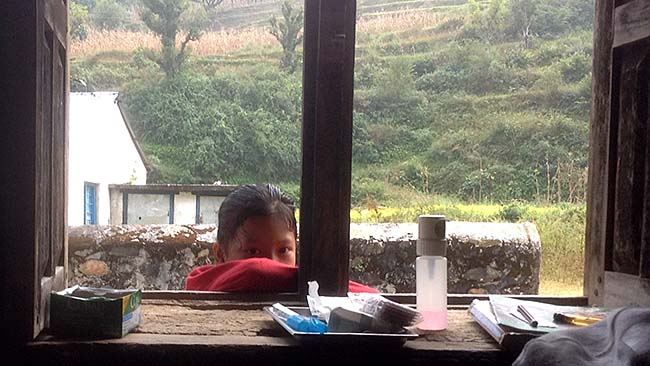
Well, I said that Nepal was going to be a life changing experience and it has been in so many ways.
Lazy Cogitation
I came to Nepal as a newly graduated Practitioner from a Chinese Oriental Medical School in Portland, OR, with all sorts of images and cogitations of what life would be like in Nepal. I thought about the many people that I would have the opportunity to treat and all of the new treatments I would learn about as they arose. The only thing that has come out of what I now call Lazy cogitation (trying to foretell what will happen), is that Iʼm in Nepal. Iʼve been confronted with many medical situations in which I had no idea what to do, and I use the Nepali term “K Garne” (What to do?) often. With no internet, it is very difficult at times to figure out what possible syndrome(s) some of my patients have. I return to the basics of the eight principles in Oriental medicine and work from there. I see many orthopedic cases, lower back pain, knee pain and different dermatological cases I previously had no experience with.
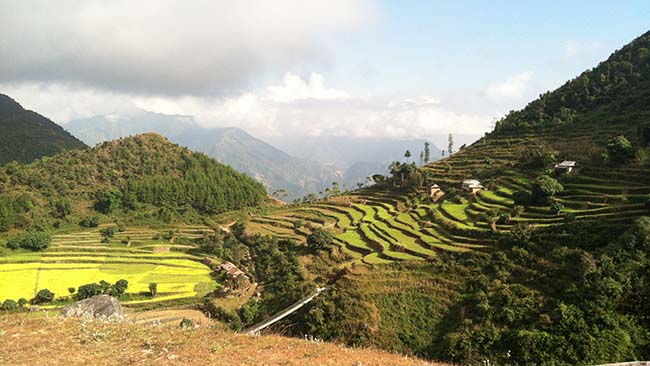
From Practitioner to A Kinder Spirit
Kogate is a rural, agricultural community that I have had the pleasure of living and serving in while here in Nepal and many of the villageʼs people have reached out and touched my life. Being immersed into this community, changes have begun to occur within me. They have invited me into their homes to share their meals, celebrate holidays, dance to their local music, sing some of their songs, drink the local home brew and just enjoy life with them. I have begun to realize that a transformation is beginning to occur; I am smiling now more often then not. Laughter is becoming something that occurs even more often now. I am still the white medical person, but they welcome me into their community with open arms and laugh with me as I try to speak the Nepali language. As they come into the clinic we now have another connection between us besides the treatment time; we have celebrated other times amongst one another.
Namaste, a greeting, has become even more meaningful as smiles are exchanged between us as we pass one another along the road or as we greet one another in the clinic before I begin their treatment. The little children of the area are so wonderful. Always coming up to the window in my treatment room and watching what is going on. As I walk up to the house that I live at, four or five of the children that live at the bottom of the hill will clasp their hands together and say Namaste with a smile and a laugh.
A very precious moment occurred one day as I was walking back up the mountain from the lower camp clinic to the clinic in Kogate. A group of school age children were walking in front of us. They were mostly girls ranging in age from 9-13 years, and one little boy maybe 8 or 9 years old. He started to walk next to me for a time. As we traveled up the hill together we played a little game. I would start to run a bit and he would chase/race along side of me. We played like this as we traveled further up the mountain. I thought to myself, does he need to turn around and head to his house? Itʼs not uncommon to see the children playing or walking along the mountain roads or trails. Reason being many of them have a long walk to school. Alman and I just continued up the mountain and I figured he knew what he was doing. I had my headphones on listening to music ( a 3 1/2 hour hike goes easier with tunes) so I took them off and put them on him to see what he would do. He smiled, moved his head back-and-forth and we continued up the mountain. All of a sudden a group of little guys joined us and began to ask me all sorts of question in Nepali. All of a sudden, Alman grasped my hand with his hand. He wasnʼt going to let anyone else in between him and I. We walked this way for the rest of the time, then a trail branched off and he went his way and I went mine. The following week as I traveled back up to Kogate ( we had to go down to the lower main camp every weekend), I saw a group of little guys sitting on a big rock. Almon was one of the boys and as soon as we recognized one another, he jumped down from the rock and ran up to me, grabbed my hand and walked with me up the road again for awhile. This time I had to branch off to take one of the short cuts so we waved good bye. Our third meeting occurred as I was walking down from Kogate. An older man and young boy were walking up and soon I realized that it was Almon. As we passed each other he reached out and grasped my hand. I have three more times to travel that route between camps. I hope I will be able to meet up with Almon again.
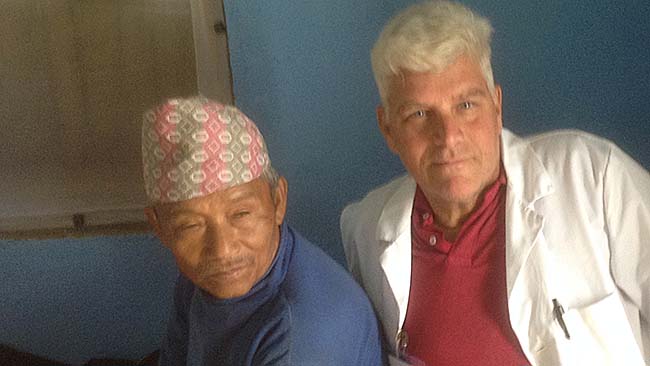
Brothers
The two young gentlemen, Suman and Bibek, are our translators. I could go on for hours talking about these two outstanding men. They are always looking for ways to help me in every aspect of life. They have taught me what true selflessness really looks like. We spend a lot of time together. We walk to clinic 4 times a day. We walk on mountain goat trails in the day and night. We eat meals together, sit and look up at the stars and laugh until tears come to our eyes. I tell them they are good friends. Their reply is always, “No! We are brothers!” As time has passed, friends of Suman and Bibek have joined us. Powan, another Suman and Bibek would spend the evening talking and laughing with us. I couldnʼt understand what they were talking about many times, but it didnʼt matter. We were enjoying life. Often, either Suman or Bibek would translate what was being said either by the young men to me in English or what I was saying to the young men in Nepali. The range of these two menʼs capabilities continuously amazes me. Their use of English is outstanding, having to translate the many questions we ask our patients during a treatment as well as in everyday conversation. They carry with them a small notebook that if a word comes up in our conversation that they didnʼt know they write it down.
As my departure date draws nearer and we sit in the night air at the top of the hill, I comment on how leaving is bitter/sweet. Bitter because I was leaving all of Kogate, the view over the village houses and fields and the people. But sweet in that I would be reunited with my dearest friend and love, Susan, my wife, and my two sons, Bryce and Forrest, and Hava, my new daughter-in-law. Suman looked at me and said “We will be your shadows.” Bibek said, “You are in our hearts. You will never be far from us.” Bibek explained that there are two kinds of shadows, good and bad. The good shadows live within the heart of the person. The bad shadows live within the head of the person.

Becoming part of the family
Not only had I become Sumanʼs and Bibekʼs Di (older brother), but I have been accepted into Sumanʼs family. Durning one of the five days of the Tihar holiday celebrations, one of the sisters in the family honors their brother by making a wreath of different flowers which they place around the brothers neck. They then place a red tika and seven different colored dots upon the red tika. Then they bring out a huge plate, which is made out of leaves, filled with many different types of foods and treats and place it in front of their brother. On that day the lower camp came up to Kogate for the weekend so they could see the village. We had had a class and were standing around when Suman came out of his house, having already gone through the honoring celebration by his oldest sister, and asked me to come into the house. The family was sitting around the room and there was a mat on the floor at one side. It was covered with flower pedals. They instructed me to go and sit on the mat. Then his oldest sister came and did the brother-honoring observance; placing a flower wreath around my neck, applying the red tika on my forehead and the seven colored dots on top of the red tika. Then I was instructed to place a red tika dot over the ones that Suman had placed on her forehead. Suman, his oldest sisterʼs son and myself sat in another area of the big room and the specially prepared plate of food was placed in front of each of us. It was a joy and honor to have been invited to be apart of this familyʼs observance.
Sumanʼs father andmother are my gracious host and hostess and now friends/family. They prepare all of our meals for us, make us hot tea each morning and share their lives with us. At times, we are invited into their home for dinner. The food is delicious. All the cooking is done on a mud-form cook stove, branches are fed into an opening at the bottom to the fire. This gives the food a smoky delightful flavoring. The food is generally the same for each meal: one hard- boiled egg for breakfast with beans, which I would put my egg into. Lunch and dinner consist of rice, with either greens or a chopped up potato in a curry sauce and a pickled salsa or radish mixture. I thought I would get tried of eating the same thing each day but I havenʼt. In fact, between walking down to the clinic and then back up the hill to the house for meals, I have lost close to 20 lbs. Nepali meals are spicy, at least for me they are. I have had to get used to my mouth and lips being hot which really hasnʼt been too difficult to do!
They ask me questions about America and my life there. Sumanʼs mother wants to come back to America with me, saying that she would cook all of Susanʼs and my meals. I told her that I feel America is not the place for her; that life here in Kogate is better. Life here is very hard but it is simpler. Not the rushing around, all the different ways in which one is pulled. When I ask my patients if they have a lot of stress in their life, they just look at me with an uncertainty. They donʼt know what stress is. They live each day and moment as it comes, taking whatever is before them as it is. At least this is how it seems to me. They donʼt understand the word stress. Sorry...a little rabbit trail.

Life in Kogate is hard but it has so many other things that make it a wonderful place to live. Here, you live each day as it arrives and do what needs to be done at a nice slow steady pace. Nobody telling you what to do, to hurry up. You do the job and if you need to stop, you stop. I tell her that life in Kogate is good.
Life in Kogote is like stepping back into American history, in that it is basic. Its simpler life is what has been a part of the transformation that has and will continue to change me.
Life in Kogate is GOOD!
If you would like to sit with me and have a cup of tea I will talk with you about the fullness that is now a part of who I am because of this life-changing experience.
To all of you who made it possible for me to come to Nepal and the people of Kogate, I THANK YOU from my heart. --- John Timm Jr.
- Details
- By Susana Correia
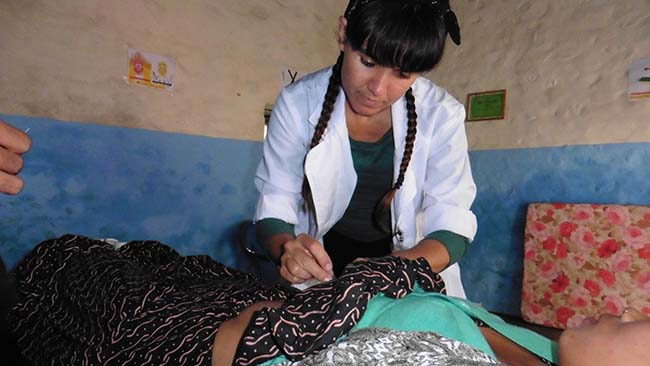
It's 4 AM and I can't sleep. I'm thinking about how much I still need to get done before wrapping up my volunteer stint here in Bhimphedi, Nepal in 10 days. I have to write this blog post and a publishable case study, which I still haven't picked out yet. All this while treating a ton of patients 6 days per week and trying to spend time with the beautiful friends that I've made here. I'm mad for letting myself get back to this state of unease and sad for the heavy loss I'm about to experience.
Coming to Nepal, I assumed I would have a somewhat stressful and uncomfortable "third world" experience. And when I first arrived, it took a while to adjust to the time change and environment. I had terrible insomnia, bowel issues, breathing problems and I was anxious about starting my work in the clinic. The first week in clinic was slightly overwhelming. Although I only treated 7 people my very first day, I still felt frazzled. I did not realize how serious the conditions would be that I would be expected to diagnose and treat. I am definitely way more than an acupuncturist here. I am a primary care doctor. Im finally getting used to saying that and believing in my ability to be just that. It is now not nearly as daunting to treat someone with a massive oozing non-healing sore, tonsillitis, uncontrolled hypertension, paralysis or diabetic neuropathies. The possibility of someone coming in with tuberculosis, fungal infections and typhoid fever does not freak me out nearly as much anymore. Just another day in the clinic.
Even out of the clinic, I no longer feel like I have a chronic case of the cooties. When I get bit by a mosquito, I no longer think "I hope I dont get malaria." And when I see a piece of chicken poop, I dont necessarily think, "Is that a leech?" I stopped using hand sanitizer every 5 seconds. I dont guzzle grapeseed extract everyday either. Maybe I won't actually contract a major disease here. Just maybe.
It was the 7th day of clinic when I finally started to feel my rhythm. I had a bunch of return patients that day, so the interpreters labeled it "Susana Day." I was in awe of how these people were trusting me with their health and actually getting better. That helped build my confidence and ease my anxiety. I was cleaning wounds, checking glucose levels, using an otoscope to check for ear infections, working with infants and kids with disabilities. I'm not saying my treatments have been perfect, but I can say that I am providing attentive and thoughtful healthcare and truly connecting with my patients.
After the first week or so, and settling into a simple routine here, I realized that I was the happiest and most peaceful that I had been in years. I wake up early, go for my walk to the look-out point above the river, do some qi gong and yoga. I get back home to eat a simple breakfast that Auntie makes in her outdoor kitchen, and head off to clinic. I work from 8:30 am to 4:30 pm, with a quick lunch of Dahl Baht. When I get off work, I take a quick rinse off in the outdoor shower/ spicket and finish my charting while waiting for Auntie to provide us with another plate of spicy Dahl Bhat for dinner. I go to bed super early and wake up in the middle of the night to go pee in the outdoor squat toilet. Six door latches later and I usually have a hard time getting back to bed. Thats when I ruminate over my patients. Then I get up and start all over again.
I am certain now that I am happiest with a simple life and a regular schedule. Back home in Brooklyn NY, things have not been so simple. The last 4 years were dedicated to intensely studying Chinese medicine while working, barely socializing and commuting around a hectic city. I did not realize just how much my irregular busy schedule was wearing me down.
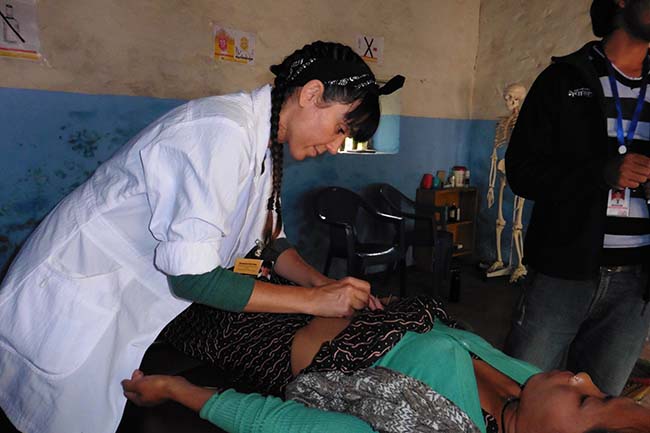
Aside from my clinic experience, I have also had other pretty epic adventures. I've visited many holy sites for both Hindus and Buddhists. But that is not limited to the myriad of temples and stuppas that are everywhere. The land here is thick with spiritual history and energetic density. While trekking in Langtang National Park, I climbed the highest I've ever climbed (almost 16,000 feet) and visited lakes and rivers that were created by Shiva himself. I hitched a ride on the crowded rooftop of the local bus up to Kogate to celebrate Tihar, the Hindu Festival of Lights. I was blown away by the density of spirit in this remote mystical shire that has the most spectacular views I have ever seen. (Kogate has since become my happy place.) Between all the gods and goddesses, witches and shamans, you feel a spiritual energy here like nowhere else I've felt.
There's been a lot of clarity for me here in Nepal. Following a simple routine in this special place has helped reconnect me with my true self again, a calm and content being. I chose to come to Nepal without knowing hardly anything about where I was actually going. Somehow I just felt it was where I needed to be. And I was right. What was supposed to be a stressful "third world" experience turned out to be one of the most peaceful and happiest moments in my life.
In the last 3 days I have treated 64 patients, 55 of those are my regular patients. Even though Im pretty exhausted by the end of the day, providing healthcare does not stress me out. It's having deadlines and taking on too many tasks and responsibilities that disrupts my spirit. Although I have seen the light again here, I need to take that light into everyday life, especially going back to NYC, the land of complexity and excess. My intention is to set up a simple life, slowly build a community-inspired acupuncture practice, and be creative and healthy. All I really need is healing, music and creativity. I'm making a promise to myself to keep it simple, stick to a regular schedule and get into nature as often as possible to feel its peaceful energy and let it always remind me of who I really am. ---Susana Correia
- Details
- By Amanda Johnson
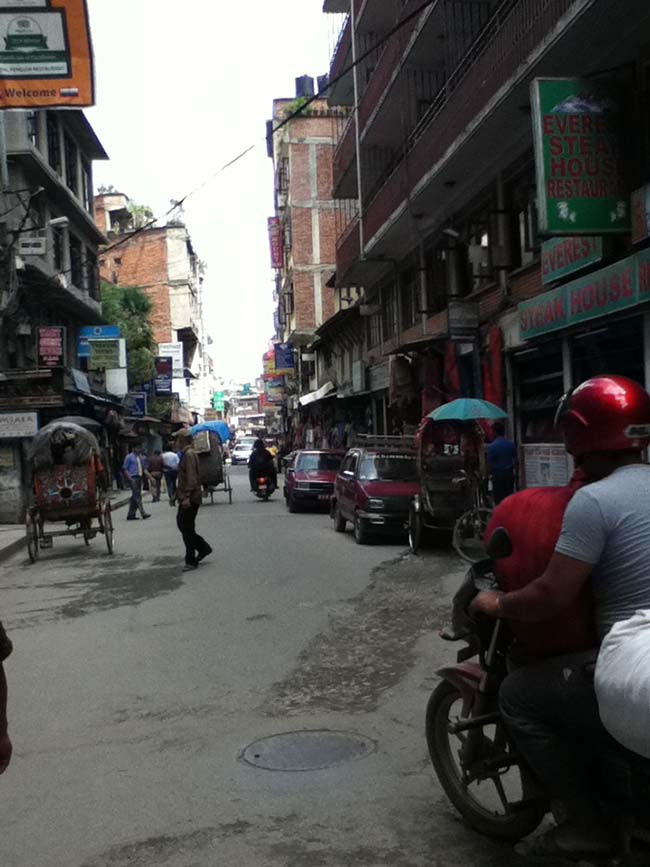
In that instant, when you’re sandwiched between a motor bike on your right, its passengers shirt tail grazing your arm, a gutter filled with unidentifiable sludge on your left, and an oncoming taxi crammed with 12 Nepalese wildly speeding toward you, you start to re-evaluate the meaning of chaos.
How do these millions of people survive in the streets of Kathmandu with no road lines, lights, stop signs or any apparent rules of the road?Cars, vans, bicycles, pedestrians, tuk-tuks and animals all playing a calculated game of frogger. It’s fastinating to watch – unnerving at times- but strangely beautiful.
I’ve learned to enjoy the thrill of going on a harrowing taxi ride, like a child enjoying rollercoasters….or a fight against incontinence!
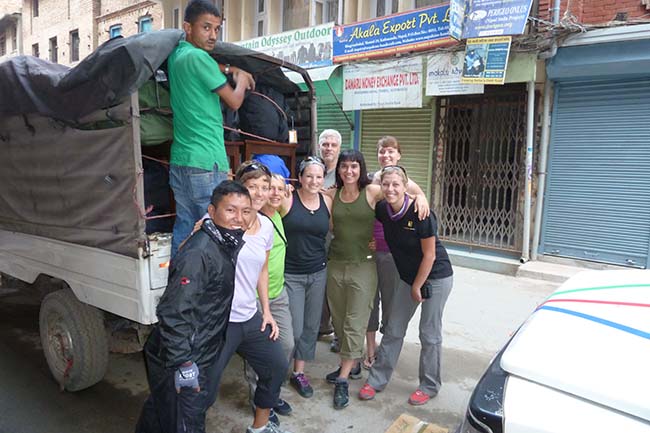
It occurs to me that perhaps why there are not many accidents (that I’ve seen) is because people are in the flow of the moment here. Not generally distracted by phones, eating in the car, putting on make-up – all the things I see far too frequently in the USA. Biking around Portland I get to watch many drivers – and a shocking number are not actually looking at the road. It’s insanity! Maybe the comfort of road lines, lights, signs has put us on auto-pilot. Our ability to take in our surroundings, to be sharp and reactive, declines. We kill people because we can’t wait to send a text?! WHAT!?
Maybe it’s love that saves lives and prevents accidents in Nepal. I have been reading the book Shantaram, a story about an Australian fugitive who escapes from prison to the slums of India. In the story, a character explains why millions of people can manage to live in relative peace together in India is because no one loves like Indians. It’s this collective love for each other that keeps people from freaking out over the claustrophobic conditions, lack of resources and general chaos. I believe this law of love, if you will, applies in Nepal.
Nothing is done alone here, potentially using the toilet is your one moment of precious privacy…potentially. People live with multiple generations of family. They walk, shop, eat, laugh, yell, cry, smoke, drink, sit on stoops together. Contrast this to the typical American, for whom it can be a struggle to car pool with another person. There’s an ingrained sense of independence in Americans. I can do this, not we can do this. Perhaps the Nepalese culture of sharing, of interdependence, plants the seeds for love to grow. I have come to know the warm love of community in Kogate, being immediately embraced as a sister and daughter into my host family. My walk to the clinic each morning is enriched by a “Namaste!”, a smile, a familiar nod. I feel as cared for by them as, I hope, they feel cared for through my work.
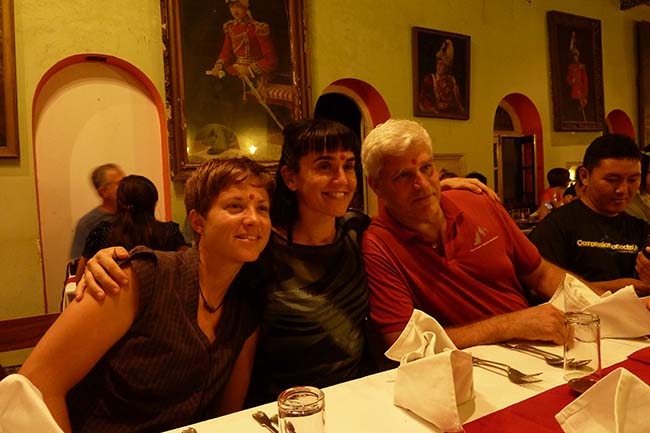
There are millions of people and animals, moving as an amoeba, depending upon each other for survival. Horns blaring here and there, not out of anger, but seemingly (again this is not my culture, so I’m speculating) to alert another of your presence. “Hey! My taxi is 1 inch from your foot, excuse me, I don’t want to crush you!”. A courtesy. When horns blare in the U.S. they’re usually followed by a violent gesture, yelling, or at least some dramatic facial gestures from the driver. I am thankful horn on horn violence is a rarity in Portland :)
So next time I’m feeling late for work, stressed about the pace of traffic, ruffled by the inevitable obstacles set before me, I’ll try to be part of the ameoba. Give thanks for the protective bubble of my car, the safety of the sidewalk, the rules of the road that, theorically, allow me to put on make-up while driving. But of course I won’t! ---Amanda Johnson
Our Mission
Acupuncture Relief Project, Inc. is a volunteer-based, 501(c)3 non-profit organization (Tax ID: 26-3335265). Our mission is to provide free medical support to those affected by poverty, conflict or disaster while offering an educationally meaningful experience to influence the professional development and personal growth of compassionate medical practitioners.
